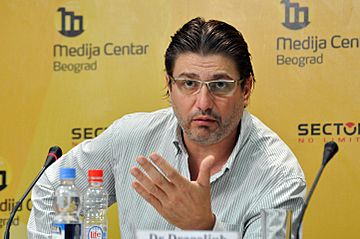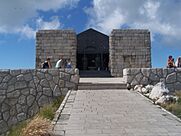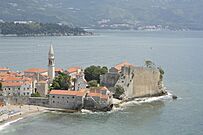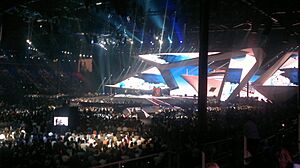Rambo Amadeus facts for kids
Quick facts for kids
Rambo Amadeus
|
|
|---|---|

Rambo Amadeus in 2011
|
|
| Background information | |
| Native name |
Рамбо Амадеус
|
| Birth name | Antonije Pušić |
| Born | 14 June 1963 Kotor, SR Montenegro, Yugoslavia (now Montenegro) |
| Origin | Herceg Novi, Montenegro |
| Genres |
|
| Occupation(s) |
|
| Instruments |
|
| Years active | 1988–present |
Antonije Pušić (Cyrillic: Антоније Пушић), born on June 14, 1963, is a famous artist known as Rambo Amadeus (Cyrillic: Рамбо Амадеус). He calls himself a "musician, poet, and media manipulator." He is a well-known artist across the countries that used to be part of former Yugoslavia.
His songs often combine funny and sharp lyrics about people and silly local politics. He mixes many music styles like jazz, rock, hip-hop, and drum and bass. He is also known for his clever and ironic humor. For example, his most famous nickname is "Rambo Amadeus the World Kilo Tzar." He changed it in 2012 to show that he believes in being humble and caring for the environment. His stage name comes from the action hero John Rambo and the famous composer Wolfgang Amadeus Mozart.
Rambo Amadeus's concerts are special because they are never just like his recorded songs. He often improvises, meaning he makes up music and jokes on the spot. He uses humor to talk about different parts of human nature in a direct way. Some fans say his style is similar to artists like Frank Zappa.
In 2012, Rambo Amadeus represented Montenegro in the Eurovision Song Contest 2012. This big music competition was held in Baku, Azerbaijan. He performed his song "Euro Neuro" there.
Contents
Growing Up and Early Life
Antonije Pušić was born in Kotor, which was then part of Yugoslavia. His family lived in Herceg Novi, where he grew up. His mother, Bosiljka Pušić, was a writer and painter. His father, Ilija Pušić, was from a village near Herceg Novi. Antonije was the second child, born after his brother Andrija.
Antonije finished his elementary and high school education in his hometown. Later, he studied tourism at the University of Belgrade. He also took piano lessons for six years but stopped before finishing.
A Champion Sailor
Before becoming a musician, Antonije was a very good competitive sailor. From 1972 to 1984, he sailed for Yugoslavia in many international races. He won the Montenegrin championship several times. He was also an 8-time champion in the South-Adriatic region. He won a national title as a junior and the International Đerdap Cup in 1980. Even today, he sometimes joins fun sailing races in the Gulf of Kotor.
Starting Music in High School
Antonije began singing and writing songs during his first year of high school. This led him to join different local bands in Herceg Novi and Titograd. One of his first performances was playing the mandolin in an orchestra. They entertained guests at a hotel in Herceg Novi.
In 1985, he moved to Belgrade for college. While studying, he also played with various amateur bands.
Musical Journey
The 1970s: Early Bands
In 1979, Rambo Amadeus started a band called "Radioaktivni otpad," but it didn't last long. He was also in "The Blues Band." He didn't like their music, so he changed the band's style. This band played throughout his high school years in places like Herceg Novi and Nikšić.
The 1980s: First Albums and Unique Style
In 1988, Rambo Amadeus suddenly appeared on the music scene with his first album, O tugo jesenja. His music was a mix of folk singing and opera, with funny lyrics and classic guitar. Since few people knew him, Rambo enjoyed confusing everyone. He introduced himself as Nagib Fazlić Nagon, a mine worker who saved money to record an album. He also jokingly called his music "turbo folk." This term later became a real music style, but Rambo used it to make fun of things.
A producer named Saša Habić helped Rambo sign with a record company called PGP RTB. Rambo later wrote a song called "Balkan Boy" about this important moment. The album's sales weren't huge, but Rambo made enough noise to stay active in music.
His next album, Hoćemo gusle, came out in 1989. This album showed more of Rambo's future style: open political satire. One song, "Amerika i Engleska (biće zemlja proleterska)," was originally going to be called "Cataclysm of Communism," but local authorities didn't allow it. The album's title makes fun of a strange event from protests in Montenegro in 1989. Protesters were heard shouting "We want the Russians," but when criticized, many claimed they actually shouted "We want gusle" (a traditional instrument).
Other songs like "Glupi hit" and "Balkan boy" also became popular. Rambo even received praise for his song "Samit u buregdžinici Laibach." In this song, he mixed the unique sound of Laibach with lyrics from famous poets and folk songs, adding his own funny words.
The 1990s: Stronger Messages and Touring
Rambo became a well-known performer in the early 1990s. His third album, Psihološko propagandni komplet M-91, was released in late 1991. This was when Yugoslavia was breaking apart. Because of this, many songs had serious lyrics and a dark, military feel. Songs like "Smrt popa Mila Jovovića," "Jemo voli jem," and "Zdravo damo" became instant hits.
This album helped Rambo become even more famous. He started playing in bigger venues like Sava centar. Because he was so outspoken and entertaining, he was often invited on TV and radio shows.
In 1992, during the "Belgrade spring" festival, he showed great bravery. He stopped a concert that was being broadcast live on TV. He told thousands of viewers that bombs were falling on other cities. He then left the stage, ending the show.
Rambo started touring in Macedonia and Slovenia after these countries became independent. He was one of the first performers from Yugoslavia to do so.
After a live album and a greatest hits collection, Rambo recorded new music in Paris in 1995 with Goran Vejvoda. This album, Mikroorganizmi, released in 1996, had a different, more experimental sound.
He also released Muzika za decu at the same time. This album was his musical take on Ljubivoje Ršumović's poetry.
Fans of Rambo's older style didn't have to wait long. In late 1996, he released Titanik. This album had songs like "Šakom u glavu" and "Zreo za penziju." Many talented musicians helped record this album.
A big tour followed, including shows in Slovenia and Bosnia. In December 1997, Rambo was the first performer from Montenegro to visit Bosnia after the war.
On June 9, 1998, Rambo played a concert in Belgrade. He said it would be his last show before retiring. Many people doubted him, but it was a memorable concert. Rambo then moved to the Netherlands for a few months, working different jobs. He soon returned to Belgrade and, not surprisingly, went back to music. He continued to break down barriers between different groups of people. On December 10, 1998, he played a show in Pula, Croatia. This was the first time since the war that a Croatian audience saw performers from Serbia and Montenegro.
The 2000s: New Sounds and Collaborations
In 2000, Rambo worked on his album Don't Happy, Be Worry. This album included the song Laganese, which used parts of a Norwegian folk song. By this time, using samples from other music and local pop culture had become a big part of his sound. This album, produced by Iztok Turk, featured songs like "Čoban je upravo napustio zgradu" and "Moj skutere."
In 2004, Rambo released his third live album, Bolje jedno vruće pivo nego četri ladna. This was followed by the studio album Oprem dobro in mid-2005.
He also made a song called "Dikh tu kava" with the ethno-jazz band Kal. In 2007, he appeared on their album in the song "Komedija" ("Comedy").
In autumn 2007, he did a unique performance called "Mixing of alternative rocks." He "played" on 12 concrete mixers in front of an audience at a festival in Belgrade.
For a New Year's show on RTV, he performed the song "Rakija" with a traditional folk orchestra. This song was later used in a TV show. In February 2008, Rambo Amadeus was a guest star with The RTS Big Band jazz orchestra for their 60th Anniversary.
Hipishizik Metafizik is his most recent studio album, released in July 2008.
The 2010s: Eurovision and Voice Acting
Montenegro's national broadcaster chose Rambo Amadeus to represent Montenegro in the Eurovision Song Contest 2012 in Baku, Azerbaijan. His song "Euro Neuro" caused some discussion because of its satirical video. He later said he was honored to have written the "worst song" at Eurovision, showing his humorous approach.
In 2013, he released a video for his new song O'Ruk on the Road Again with Three Winnettous.
In 2015, he released the album Vrh dna. This album included a song from 2011 called "Rano Za Početak," which he renamed "Samo Balade" for the album.
In 2016, Rambo lent his voice to two animated movies. He was the voice of Mighty Eagle in the Croatian and Serbian versions of The Angry Birds Movie. He also voiced Crush in the Serbian version of Finding Dory.
In 2018, he tried to represent Serbia in the Eurovision Song Contest 2018. He performed the song "Nema Te" as a duet with jazz singer Beti Đorđević in the Beovizija 2018 competition, finishing in 9th place.
Other Creative Projects
Besides his music career, Rambo often works on different and sometimes unusual projects.
- He wrote music for various theater plays, such as Đetić u parlament and Oksimoron. He also wrote music for Lažni car Šćepan Mali and won an award for it in 1994.
- Rambo also wrote lyrics for popular folk singers like Lepa Brena. He wrote the entire music score for the 1994 film Slatko od snova.
- In 1994, he created a musical score for the 1927 silent movie Metropolis by Fritz Lang. His music was played by the Belgrade Philharmonic during a movie screening. He later recorded this music himself and released it as Metropolis B (Tour-de-Force).
- A year later, he arranged a special part (cadenza) for a piano and orchestra concert by W.A. Mozart. This part was performed in 1995.
- Since early 2005, Rambo has written a column called Megacarska razmišljanja (Mega-Imperial Thoughts) for the newspaper Blic.
- Rambo has also done voice-work for Serbian-Croatian versions of animated movies. These include Despicable Me, Ice Age: Continental Drift, Madagascar 3: Europe's Most Wanted, The Angry Birds Movie, and Finding Dory.
Discography
Studio albums
- O tugo jesenja (1988)
- Hoćemo gusle (1989)
- Psihološko propagandni komplet M-91 (1991)
- Muzika za decu (1995)
- Mikroorganizmi (1996)
- Titanik (1997)
- Metropolis B (tour-de-force) (1998)
- Don't Happy, Be Worry (2000) – released as Čobane vrati se in Slovenia and Croatia
- Oprem Dobro (2005)
- Hipishizik Metafizik (2008)
- Vrh Dna (2015)
- Brod budala (2020)
EPs
- Yes No (2008)
Live albums
- Koncert u KUD France Prešeren (1997)
- Bolje jedno vruće pivo nego četri ladna (2004)
- Rambo Amadeus & Mutant Dance Sextet u Domu Sindikata (2011)
Compilations
- Izabrana dela (1994)
- Zbrana dela 1 (1998)
- Zbrana dela 2 (1998)
Band Members
Current members
- Rambo Amadeus (World Kilo Tzar) – guitar, fretless guitar, vocals, arrangement
Live members
- Miroslav Tovirac – bass (2012–)
- Igor Malešević – drums, percussion (2012)
Also associated
- Aleksandra Kovač – vocals
- Kristina Kovač – vocals
- Nenad Knežević-Knez – vocals
- Goran Ljuboja "Trut" – drums
- Mihajlo Krstić – bass
- Vladimir Čukić – bass
- Vojno Dizdar – keyboards
- Digital Mandrak
- Goran Vejvoda
- Gojko Sisa
- Ilija Milutinović "Popara"
- Vitez Šablon Dimija
See also
 In Spanish: Rambo Amadeus para niños
In Spanish: Rambo Amadeus para niños
 | George Robert Carruthers |
 | Patricia Bath |
 | Jan Ernst Matzeliger |
 | Alexander Miles |




